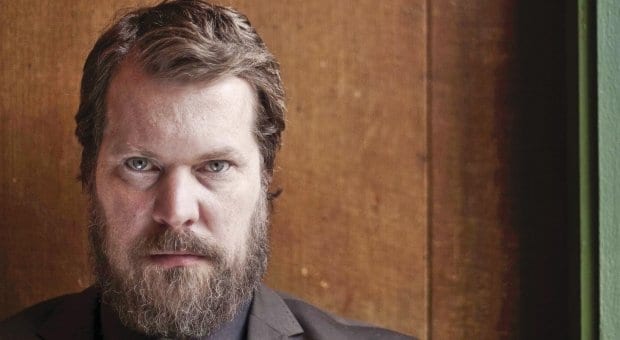When John Grant answers the phone, he is stuck in traffic en route to a gig in Chicago, yet he is making the best of it.
“Ooh, there’s a Nissan next to us and it’s a beautiful blue colour,” he says. “And look who’s driving it! There’s some hot beef on this highway.”
The 44-year-old baritone-voiced musician has a way of finding humour in more dire circumstances. Formerly the front-man for Denver rock group The Czars, Grant has chronicled his battles with addiction and depression, homophobia, a particularly devastating breakup, and an HIV diagnosis on solo albums Queen of Denmark and Pale Green Ghosts, which came out earlier this year.
His candour and heartbreakingly self-effacing songwriting has attracted Sinead O’Connor, who covered “Queen of Denmark” on her most recent album and sang backup on five Pale Green Ghosts songs, and Elton John, who invited Grant to cover “Sweet Painted Lady” for an upcoming reissue of his 1973 album Goodbye Yellow Brick Road.
Recorded with producer GusGus’s Biggi Veira in Grant’s new home base in Iceland, Pale Green Ghosts is largely about his adolescence. It’s full of squelchy synths and icy balladry that nods to the dark new-wave music he grew up listening to in the 1980s, a sound he plans on incorporating into his music from now on.
Why did you move to Iceland?
I had always wanted to go and spend time in Iceland, since 1987, when I discovered The Sugarcubes and saw pictures of the landscape. It was a long time coming. And then, when I went there, I met lots of great people and Biggi, and we hit it off. I went there to do my record, and I ended up staying. I like the silence. I like that there aren’t so many people. I love getting to know new cultures and tackling new languages.
Does learning different languages influence you as a songwriter?
My love for languages shows in my songs. The greatest way it’s impacted my songwriting is that it’s forced my English to get better. You can’t learn another language without really knowing your own language. It’s going to make it a lot easier for you to build into other languages if you understand your own first language. Just because you were born in America or England doesn’t mean that you’ve mastered the English language. That’s something that I’ve learned.
With this album you revisited the 1980s, sonically and thematically.
It’s as if I’m taking inventory of my life. Queen of Denmark was more based on my childhood and the ’70s. Next is the ’80s, where I really discovered my love, which is electronic music, synthesizers and new wave and all the music I still listen to. You’ll hear that more in my music from now on. I was just starting to discover those things. It does seem to make a lot of sense, even though I didn’t consciously plan it that way.
Can you tell me about the song you wrote with Hercules and Love Affair, “I Try to Talk to You”?
It’s me expressing sadness about how I never had a dialogue with myself in a loving manner, and how I wasn’t able to be gentle with myself or see myself as a human being. The total rejection of the self is what led me to escape into alcohol and drugs. That self-destructive behaviour is something I was still holding on to when I went out and had unprotected sex and got HIV. That song is expressing the regret about not being able to love yourself, protect yourself or take care of yourself.
You use a lot of film references in your lyrics.
Can you tell me about the song “Ernest Borgnine” and why you like him?
I always liked his face and his voice. He was just a part of growing up — he was always there. I was never sexually attracted to him, but I loved him as an actor. The song is about my love for Woody Allen movies. He has one called Purple Rose of Cairo, which is about a woman who escapes into a movie. “Ernest Borgnine” is loosely based on that. It’s about me escaping from reality, the psychological mind-fuck of dealing with the diagnosis and dealing with forgiving yourself because you only have yourself to blame, in my case, anyway.
There is a lot of anger on this album. How has it been revisiting that on tour?
There are some nights where I think, “Oh fuck, I don’t want to think about this or talk about this right now,” but once you get into the song, it’s fine. It’s not something that weighs on me for more than a few moments. I’m an adult, and I can understand that everybody has a bunch of shit going on. I also don’t think that negative things are necessarily negative. There are a lot of people who could think, “Why are you talking about this shit? This is a total buzzkill, dude!” But I don’t see it that way. I don’t think of confronting these issues as a bummer.
The best pop songs are often about subjects that might not seem suitable for pop songs.
It’s good to do that. There is a lot of humour built into my songs, which indicates that I’m aware that the pain I talk about is a universal theme. I’m not talking about my pain; I’m talking about the pain of being human.

 Why you can trust Xtra
Why you can trust Xtra


